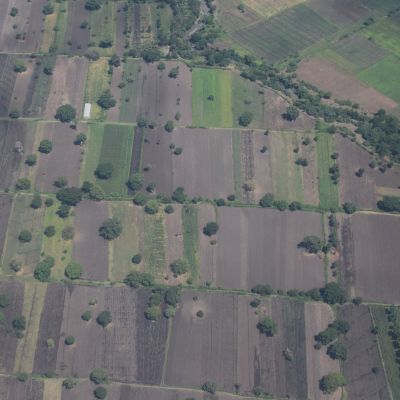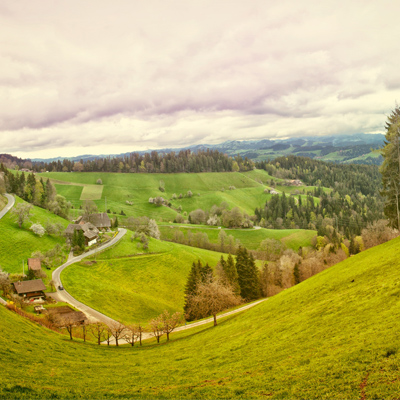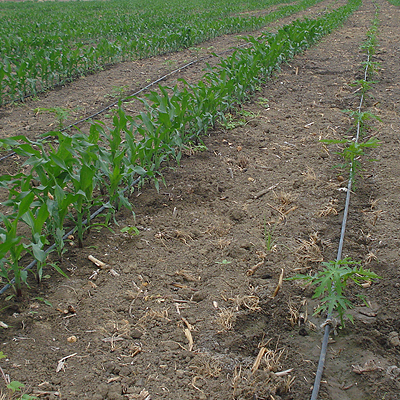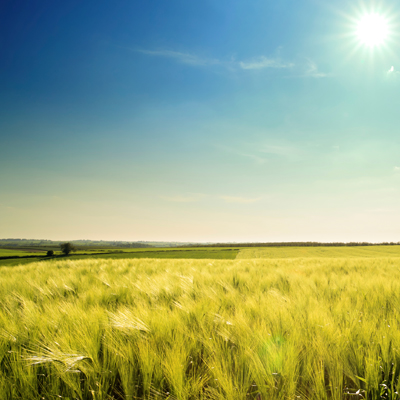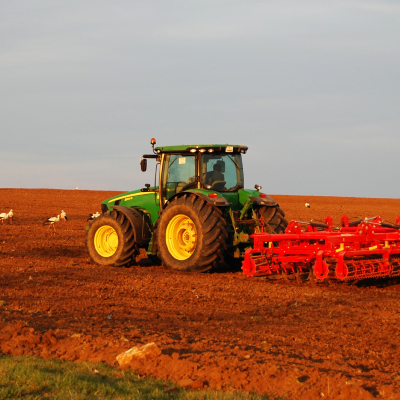Contact Dr Anil Graves
- Tel: +44 (0) 1234 754294
- Email: a.graves@cranfield.ac.uk
- ORCID
Areas of expertise
- Carbon, Climate and Risk
- Digital Agriculture
- Natural Capital
- Soil
- Soil Resources
- Sustainable Land Systems
Background
Anil holds a BSc (Hons) in Natural Resources Development (University of East Anglia), an MSc in Land and Water Management (Cranfield) and a PhD in bio-economic evaluation of arable, forestry, and agroforestry systems for Europe (Cranfield).
Prior to joining Cranfield University, Anil initially spent seven years working in southern India on a range of integrated catchment management and reforestation projects for government and non-government agencies. He also researched the hydrological impacts of reforestation, using the calibrated heat pulse method to measure sap flow in trees, and the impact that reforestation had on soil properties. Further research included mapping groundwater abstraction patterns by domestic and agricultural users, as well as assessing coastal saline intrusion patterns in groundwater aquifers.
Anil is currently a Senior Lecturer in Land Use Systems with 20 years of experience in researching land based systems and resources in the UK, Europe and internationally. His research applies biophysical, social, economic, agronomic and ecological methods to assess and value of benefits and trade-offs in land use systems, arising through land use change, and under different future scenarios. This has involved the development of spatially and temporally dynamic biophysical and economic models, integrating market and non-market values, and the application of social science methods. Anil is also involved in field based projects examining the growth, yield, and resource use of novel multi-purpose field crops.
Current activities
Current research includes an economic and social impact assessment of two novel multi-purpose plants, Sida hermaphrodita and Silphium perfoliatum on the SidaTim project (EU), a financial and economic assessment of the value of wetlands on the WetlandLIFE project (NERC) and an assessment of the food, environment, energy and water nexus in Peru and Ecuador (NERC/CONICYT).
Recent projects have also focussed on the application of valuation within an ecosystem framework. In this respect, Anil has evaluated the trade-offs between arable, livestock, forestry, and agroforestry systems in Europe, the impact of future land use options on peat degradation, food security, and GHG emissions, and the cost of soil degradation in England and Wales. He has also applied social science methods to understanding how biodiversity supports the flow of cultural services from land, evaluate farmer preferences for non-production farm assets and has undertaken stakeholder analysis in relation to UK farmland bird populations.
Some current and recent projects include the following:
New pathways of intensified biomass production: assessing the potential of Sida Hermaphridita and valuable timber trees (FACCEIP)
Taking the bite out of wetlands: Managing mosquitoes and the socio-ecological value of wetlands for wellbeing (NERC)
NEXus Thinking for sustainable Agricultural development in Andean Countries (NEXT-AG) (NERC/CONICYT)
Regenerative Agriculture: What can we achieve and how can we scale it? (SystemIQ)
Agroforestry that will advance rural development (EU)
How does a loss of soil depth impact on the ability of soils to deliver vital ecosystem services (Defra)
Biodiversity and the Provision of Multiple Ecosystem Services in Current and Future Lowland Multifunctional Landscapes (NERC BESS)
Matching scales: impact of natural scales on planning and policy decisions (NERC) Ecosystem Interactions (Defra)
Better evidence for regulatory reform (Defra) Restoration of Fen Peatland under Climate Change (ASC)
The total cost of soil degradation in England and Wales (Defra)
FarmingTruth: fusion of satellite and ground based information on soil and crops for optimised crop production (ESA)
The impact of lowland peatland restoration on food production and security in the UK (Natural England)
Economic and Environmental Performance of Livestock Systems (Defra)
Evaluating the options of combining economically, socially and ecologically sustainable agriculture" (RELU).
Clients
- Adaptation Sub-Committee of the Committee on Climate Change
- Committee on Climate Change (DEFRA)
- Commonwealth Human Ecology Council
- Department for Environment, Food and Rural Affairs
- Foreign & Commonwealth Development Office
- Environment Agency
- EU CAP Network
- European Space Agency
- German-Israeli Fund for Scientific Research and Development
- Natural England
- Natural Environment Research Council
- Royal Society fo the Protection of Birds
Publications
Articles In Journals
- Odunga GO, Bidzakin JK, Okaka P, Okoth S, Mutsotso B, .... (2025). Peanut value chain development: the case of Lower Lake Victoria Basin of Kenya. Economies, 13(4)
- Giannitsopoulos ML, Burgess PJ, Graves AR, Olave RJ, Eden JM, .... (2025). Predicted yield and soil organic carbon changes in agroforestry, woodland, grassland, and arable systems under climate change in a cool temperate Atlantic climate. Agronomy for Sustainable Development, 45(3)
- Pronti A, Zegarra E, Rey Vicario D & Graves A. (2024). Global exports draining local water resources: land concentration, food exports and water grabbing in the Ica Valley (Peru). World Development, 177
- Hubatova M, McGinlay J, Parsons DJ, Morris J & Graves AR. (2023). Assessing preferences for cultural ecosystem services in the English countryside using Q methodology. Land, 12(2)
- Bidzakin JK, Graves A, Awunyo-Vitor D, Yeboah O, Yahaya I, .... (2023). Utilization of organic fertilizer in Ghana: implications for crop performance and commercialization. Advances in Agriculture, 2023(1)
- Chunga BA, Graves A & Knox JW. (2023). Evaluating barriers to effective rural stakeholder engagement in catchment management in Malawi. Environmental Science and Policy, 147(September)
- Sakrabani R, Garnett K, Knox JW, Rickson RJ, Pawlett M, .... (2023). Towards net zero in agriculture: future challenges and opportunities for arable, livestock and protected cropping systems in the UK. Outlook On Agriculture, 52(2)
- Correa-Cano ME, Salmoral G, Rey Vicario D, Knox JW, Graves A, .... (2022). A novel modelling toolkit for unpacking the Water-Energy-Food-Environment (WEFE) nexus of agricultural development. Renewable and Sustainable Energy Reviews, 159(May)
- Cumplido-Marin L, Burgess PJ, Facciotto G, Coaloa D, Morhart C, .... (2022). Comparative economics of Sida hermaphrodita (l.) Rusby and Silphium perfoliatum L. as bioenergy crops in Europe. Energy Nexus, 6(June)
- Bidzakin JK, Yeboah O, Sugri I, Graves A & Awunyo-Vitor D. (2022). Economics of bulk storage techniques: maize and cowpea storage in Ghana. Advances in Agriculture, 2022(1)
- Cumplido-Marin L, Graves AR, Burgess PJ & Williams A. (2022). On-farm greenhouse gas emissions associated with the cultivation of two new bioenergy crops in the UK. Energy Nexus, 8(December)
- Žalac H, Burgess P, Graves A, Giannitsopoulos M, Paponja I, .... (2021). Modelling the yield and profitability of intercropped walnut systems in Croatia. Agroforestry Systems, 97(3)
- Kaske KJ, García de Jalón S, Williams AG & Graves AR. (2021). Assessing the impact of greenhouse gas emissions on economic profitability of arable, forestry, and silvoarable systems. Sustainability, 13(7)
- Smith J, Westaway S, Mullender S, Giannitsopoulos M & Graves A. (2021). Making hedgerows pay their way: the economics of harvesting field boundary hedges for bioenergy. Agroforestry Systems, 97(3)
- Rolo V, Roces-Díaz JV, Torralba M, Kay S, Fagerholm N, .... (2021). Mixtures of forest and agroforestry alleviate trade-offs between ecosystem services in European rural landscapes. Ecosystem Services, 50(August)
- Bullock JM, McCracken ME, Bowes MJ, Chapman RE, Graves AR, .... (2021). Does agri-environmental management enhance biodiversity and multiple ecosystem services?: A farm-scale experiment. Agriculture, Ecosystems & Environment, 320(October)
- Ndubueze-Ogaraku ME & Graves A. (2021). Measuring Technical Efficiency of the Smallholder Crop Farms Using Stochastic Production Frontier Approach. Asia-Pacific Journal of Rural Development, 31(2)
- Crous-Duran J, Graves AR, García de Jalón S, Kay S, Tomé M, .... (2020). Quantifying regulating ecosystem services with increased tree densities on European farmland. Sustainability, 12(16)
- Damianidis C, Santiago-Freijanes JJ, den Herder M, Burgess P, Mosquera-Losada MR, .... (2020). Agroforestry as a sustainable land use option to reduce wildfires risk in European Mediterranean areas. Agroforestry Systems, 95(5)
- Giannitsopoulos ML, Graves AR, Burgess PJ, Crous-Duran J, Moreno G, .... (2020). Whole system valuation of arable, agroforestry and tree-only systems at three case study sites in Europe. Journal of Cleaner Production, 269
- Cumplido-Marin L, Graves AR, Burgess PJ, Morhart C, Paris P, .... (2020). Two novel energy crops: Sida hermaphrodita (L.) Rusby and Silphium perfoliatum L. - State of knowledge. Agronomy, 10(7)
- Salmoral G, Zegarra E, Vázquez-Rowe I, González FG, Castillo LD, .... (2020). Water-related challenges in nexus governance for sustainable development: Insights from the city of Arequipa, Peru. Science of The Total Environment, 747
- García de Jalón S, Burgess P, Curiel Yuste J, Moreno G, Graves A, .... (2019). Dry deposition of air pollutants on trees at regional scale: a case study in the Basque Country. Agricultural and Forest Meteorology, 278
- Cremades R, Mitter H, Tudose NC, Sanchez-Plaza A, Graves A, .... (2019). Ten principles to integrate the water-energy-land nexus with climate services for co-producing local and regional integrated assessments. Science of The Total Environment, 693
- Fagerholm N, Torralba M, Moreno G, Girardello M, Herzog F, .... (2019). Cross-site analysis of perceived ecosystem service benefits in multifunctional landscapes. Global Environmental Change, 56
- Kay S, Graves A, Palma JHN, Moreno G, Roces-Díaz JV, .... (2019). Agroforestry is paying off – Economic evaluation of ecosystem services in European landscapes with and without agroforestry systems. Ecosystem Services, 36
- Sonja K, Rega C, Moreno G, den Herder M, Palma JHN, .... (2019). Agroforestry creates carbon sinks whilst enhancing the environment in agricultural landscapes in Europe. Land Use Policy, 83
- Crous-Duran J, Graves A, García de Jalón S, Paulo JA, Tomé M, .... (2019). Assessing food sustainable intensification potential of agroforestry using a carbon balance method. iForest - Biogeosciences and Forestry, 12(1)
- Pantera A, Burgess PJ, Mosquera-Losada MR, Moreno G, López-Díaz ML, .... (2018). Agroforestry for high value tree systems in Europe. Agroforestry Systems, 92(4)
- Kay S, Crous-Duran J, García de Jalón S, Graves A, Palma JHN, .... (2018). Landscape-scale modelling of agroforestry ecosystems services in Swiss orchards: a methodological approach. Landscape Ecology, 33(9)
- McGinlay J, Parsons DJ, Morris J, Graves A, Hubatova M, .... (2018). Leisure activities and social factors influence the generation of cultural ecosystem service benefits. Ecosystem Services, 31
- de Jalón SG, Graves A, Moreno G, Palma JHN, Crous-Duran J, .... (2018). Forage-SAFE: a model for assessing the impact of tree cover on wood pasture profitability. Ecological Modelling, 372
- García de Jalón S, Burgess PJ, Graves A, Moreno G, McAdam J, .... (2017). How is agroforestry perceived in Europe? An assessment of positive and negative aspects by stakeholders - WITHDRAWN DUPLICATE - see CERES http://dspace.lib.cranfield.ac.uk/handle/1826/12715. Agroforestry Systems, 92(4)
- García de Jalón S, Graves A, Palma JHN, Williams A, Upson M, .... (2017). Modelling and valuing the environmental impacts of arable, forestry and agroforestry systems: a case study. Agroforestry Systems, 92(4)
- King HP, Morris J, Graves A, Bradbury RB, McGinlay J, .... (2017). Biodiversity and cultural ecosystem benefits in lowland landscapes in southern England. Journal of Environmental Psychology, 53
- McGinlay J, Parsons DJ, Morris J, Hubatova M, Graves A, .... (2017). Do charismatic species groups generate more cultural ecosystem service benefits?. Ecosystem Services, 27
- Graves AR, Burgess PJ, Liagre F & Dupraz C. (2017). Farmer perception of benefits, constraints and opportunities for silvoarable systems: preliminary insights from Bedfordshire, England. Outlook on Agriculture, 46(1)
- Ridding LE, Redhead JW, Oliver TH, Schmucki R, McGinlay J, .... (2017). The importance of landscape characteristics for the delivery of cultural ecosystem services. Journal of Environmental Management, 206
- Rois-Díaz M, Lovric N, Lovric M, Ferreiro-Domínguez N, Mosquera-Losada MR, .... (2017). Farmers’ reasoning behind the uptake of agroforestry practices: evidence from multiple case-studies across Europe. Agroforestry Systems, 92(4)
- Kay S, Crous-Duran J, Ferreiro-Domínguez N, García de Jalón S, Graves A, .... (2017). Spatial similarities between European agroforestry systems and ecosystem services at the landscape scale. Agroforestry Systems, 92(4)
- Palma JHN, Crous-Duran J, Graves A, García de Jalón S, Upson M, .... (2017). Integrating belowground carbon dynamics into Yield-SAFE, a parameter sparse agroforestry model. Agroforestry Systems, 92(4)
- Sereke F, Dobricki M, Wilkes J, Kaeser A, Graves AR, .... (2016). Swiss farmers don’t adopt agroforestry because they fear for their reputation. Agroforestry Systems, 90(3)
- Graves AR, Morris J, Deeks LK, Rickson RJ, Kibblewhite MG, .... (2015). The total costs of soil degradation in England and Wales. Ecological Economics, 119
- Chatterton J, Graves A, Audsley E, Morris J & Williams A. (2015). Using systems-based life cycle assessment to investigate the environmental and economic impacts and benefits of the livestock sector in the UK. Journal of Cleaner Production, 86
- Rickson RJ, Deeks LK, Graves A, Harris JAH, Kibblewhite MG, .... (2015). Input constraints to food production: the impact of soil degradation. Food Security, 7(2)
- Sereke F, Graves AR, Dux D, Palma JHN & Herzog F. (2015). Innovative agroecosystem goods and services: key profitability drivers in Swiss agroforestry. Agronomy for Sustainable Development, 35(2)
- Kibblewhite MG, Bellamy PH, Brewer TR, Graves AR, Dawson CA, .... (2014). An exploration of spatial risk assessment for soil protection: Estimating risk and establishing priority areas for soil protection. Science of The Total Environment, 473-474
- Morhart CD, Douglas GC, Dupraz C, Graves AR, Nahm M, .... (2014). Alley coppice—a new system with ancient roots. Annals of Forest Science, 71(5)
- Talbot G, Roux S, Graves A, Dupraz C, Marrou H, .... (2014). Relative yield decomposition: A method for understanding the behaviour of complex crop models. Environmental Modelling & Software, 51
- Cooke IR, Mattison EHA, Audsley E, Bailey AP, Freckleton RP, .... (2013). Empirical Test of an Agricultural Landscape Model. Sage Open, 3(2)
- Kulak M, Graves A & Chatterton J. (2013). Reducing greenhouse gas emissions with urban agriculture: A Life Cycle Assessment perspective. Landscape and Urban Planning, 111(1)
- Coleby AM, van der Horst D, Hubacek K, Goodier C, Burgess PJ, .... (2012). Environmental Impact Assessment, ecosystems services and the case of energy crops in England. Journal of Environmental Planning and Management, 55(3)
- Hanley N, Acs S, Dallimer M, Gaston KJ, Graves A, .... (2012). Farm-scale ecological and economic impacts of agricultural change in the uplands. Land Use Policy, 29(3)
- Keesman KJ, Graves A, van der Werf W, Burgess PJ, Palma J, .... (2011). A system identification approach for developing and parameterising an agroforestry system model under constrained availability of data. Environmental Modelling & Software, 26(12)
- Graves AR, Burgess PJ, Liagre F, Terreaux J-P, Borrel T, .... (2011). Farm-SAFE: the process of developing a plot- and farm-scale model of arable, forestry, and silvoarable economics. Agroforestry Systems, 81(2)
- Graves AR, Burgess PJ, Palma J, Keesman KJ, van der Werf W, .... (2010). Implementation and calibration of the parameter-sparse Yield-SAFE model to predict production and land equivalent ratio in mixed tree and crop systems under two contrasting production situations in Europe. Ecological Modelling, 221(13-14)
- van der Hilst F, Dornburg V, Sanders JPM, Elbersen B, Graves A, .... (2010). Potential, spatial distribution and economic performance of regional biomass chains: The North of the Netherlands as example. Agricultural Systems, 103(7)
- Reed MS, Graves A, Dandy N, Posthumus H, Hubacek K, .... (2009). Who's in and why? A typology of stakeholder analysis methods for natural resource management. Journal of Environmental Management, 90(5)
- Cooke IR, Queenborough SA, Mattison EHA, Bailey AP, Sandars DL, .... (2009). Integrating socio‐economics and ecology: a taxonomy of quantitative methods and a review of their use in agro‐ecology. Journal of Applied Ecology, 46(2)
- Keesman KJ, Graves A, van der Werf W & Burgess P. (2009). System Identification in Production Ecology: from theory to agroforestry practice. IFAC Proceedings Volumes, 42(10)
- van der Werf W, Keesman K, Burgess P, Graves A, Pilbeam D, .... (2007). Yield-SAFE: A parameter-sparse, process-based dynamic model for predicting resource capture, growth, and production in agroforestry systems. Ecological Engineering, 29(4)
- Palma JHN, Graves AR, Burgess PJ, Keesman KJ, van Keulen H, .... (2007). Methodological approach for the assessment of environmental effects of agroforestry at the landscape scale. Ecological Engineering, 29(4)
- Graves AR, Burgess PJ, Palma JHN, Herzog F, Moreno G, .... (2007). Development and application of bio-economic modelling to compare silvoarable, arable, and forestry systems in three European countries. Ecological Engineering, 29(4)
- Palma JHN, Graves AR, Bunce RGH, Burgess PJ, de Filippi R, .... (2007). Modeling environmental benefits of silvoarable agroforestry in Europe. Agriculture, Ecosystems & Environment, 119(3-4)
- Graves AR, Burgess PJ, Liagre F, Terreaux J-P & Dupraz C. (2006). Development and use of a framework for characterising computer models of silvoarable economics. Agroforestry Systems, 67(3)
- Graves AR, Burgess PJ, Liagre F, Terreaux J-P & Dupraz C. (2005). Development and Use of a Framework for Characterising Computer Models of Silvoarable Economics. Agroforestry Systems, 65(3)
- Graves AR, Burgess PJ, Liagre F, Terreaux J-P & Dupraz C. (2005). Development and use of a framework for characterising computer models of silvoarable economics. Agroforestry Systems, 65(1)
- Graves A, Matthews R & Waldie K. (2004). Low External Input Technologies for Livelihood Improvement in Subsistence Agriculture. Advances in Agronomy, 82
- Graves AR, Hess T, Matthews RB, Stephens W & Middleton T. (2002). Crop Simulation Models as Tools in Computer Laboratory and Classroom‐Based Education. Journal of Natural Resources and Life Sciences Education, 31(1)
- Matthews R, Stephens W, Hess T, Middleton T & Graves A. (2002). Applications of crop/soil simulation models in tropical agricultural systems. Advances in Agronomy, 76
Conference Papers
- Bury M, Facciotto G, Chiocchini F, Cumplido-Marín L, Graves A, .... (2019). Preliminary results regarding yields of virginia mallow (Sida hermaphrodita (l.) rusby) and cup plant (silphium perfoliatum l.) in different condition of europe
- Burgess P, Moreno G, Pantera A, Kanzler M, Hermansen J, .... (2018). Creating agroforestry innovation and best practice leaflets
- Facciotto G, Bury M, Chiocchini F, Cumplido-Marin L, Czyż H, .... (2018). Performance of Sida hermaphrodita and silphium perfoliatum in Europe: Preliminary results
- Crous-Duran J, Graves AR, Paulo JA, Mirck J, Oliveira TS, .... (2018). Modelling tree density effects on provisioning ecosystem services in Europe
- García de Jalón S, Graves A, Moreno G, Palma JHN, Crous-Duran J, .... (2017). Forage-SAFE: a tool to assess the management and economics of wood pasture systems
- Burgess P, Graves A & Garcia DJS. (2016). Complexity and agroforestry: ways to embrace the challenge
- Kit Ngai TK, Mills O, French G, De Oliveira R, Lepore C, .... (2013). A global review of capacity building organizations in water sanitation, and hygiene for developing countries
- Palma JHN, Graves AR, Burgess PJ, van der Werf W & Herzog F. (2009). Silvoarable agroforestry in Europe - systems for meeting food and industry crop requirements with improved resource-use efficiency
- Keesman KJ, Graves A, Van Der Werf W & Burgess P. (2009). System identification in production ecology: From theory to agroforestry practice
- Palma JHN, Graves AR, Burgess PJ & Herzog F. (2007). Silvoarable agroforestry in Europe - a sustainable and higher resource efficiency system for biomass production
- Palma J, Graves AR, Burgess PJ, van der Werf W & Herzog F. (2007). Integrating environmental and economic performance to assess modern silvoarable agroforestry in Europe
- Palma JHN, Graves AR, Burgess PJ, Reisner Y & Herzog F. (2005). Environmental and economic performance of agroforestry along a European gradient
- Palma J, Graves AR, Bregt A, Bunce R, Burgess PJ, .... (2004). Integrating soil erosion and profitability in the assessment of silvoarable agroforestry at the landscape scale.
Books
- Burgess P, Graves A, de Jalón SG, Palma J, Dupraz C, .... (2019). Modelling agroforestry systems In Mosquera-Losada RM & Prabhu R (eds), Burleigh Dodds Series in Agricultural Science. Burleigh Dodds Science Publishing.
- Burgess P, den Herder M, Dupraz C, Garnett K, Giannitsopoulos M, .... (2018). AGFORWARD Project Final Report
- Burgess P, den Herder M, Dupraz C, Garnett K, Giannitsopoulos M, .... (2018). AGFORWARD Third Periodic Report: July 2016 to December 2017
- Burgess PJ, den HM, Dupraz C, Garcia DJS, Garnett K, .... (2016). AGFORWARD Second Periodic Report: January 2015 to June 2016.
- McAdam JH, Burgess PJ, Graves AR, Rigueiro-Rodríguez A & Mosquera-Losada MR. (2009). Classifications and Functions of Agroforestry Systems in Europe In Rigueiro-Rodriguez A, McAdam J & Mosquera-Losada MR (eds), Advances in Agroforestry (6). Springer Netherlands.
- Graves AR, Burgess PJ, Liagre F, Pisanelli A, Paris P, .... (2009). Farmer Perceptions of Silvoarable Systems in Seven European Countries In Rigueiro-Rodriguez A, McAdam JH & Mosquera-Losada MR (eds), Advances in Agroforestry (6). Springer Netherlands.
- Palma JHN, Graves AR, Bunce RGH, Burgess PJ, de Filippi R, .... (2006). Modelling environmental benefits of silvoarable agroforestry in Europe In Changing European farming systems for a better future. Brill | Wageningen Academic.
- Palma JHN, Graves AR, Bunce RGH, Burgess PJ, De Filippi R, .... (2006). Changing European farming systems for a better future In Langeveld H & Röling N (eds), Changing European Farming Systems for A Better Future New Visions for Rural Areas. Brill | Wageningen Academic.
- Graves AR, Hess TM & Matthews RB. (2002). Chapter 11: Using models as tools in education and training In Matthews RB & Stephens W (eds), Crop-Soil Simulation Models: Applications in Developing Countries. CAB International.
- Graves A, Hess T & Matthews R. (2002). Using models as tools in education and training. In Crop-soil simulation models: applications in developing countries. CABI Publishing.



